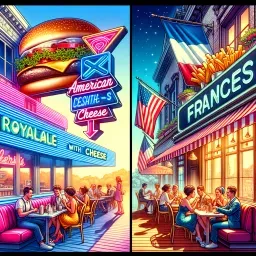”Just because you are a character doesn'
t mean that you have character“

0
0
0
0
- Meaning
- The meaning of this phrase centers on the idea that being a distinct persona or character does not ensure true integrity or moral excellence. It suggests that one can play a role or be perceived as interesting and vibrant while lacking depth or ethical substance. This invites philosophical considerations about identity, integrity, and what it means to be a 'good person.'
- Allegory
- The image’s vibrant mask represents the roles people play in society, showcasing superficial traits and surface-level impressions. The shadowy figure behind serves as a reminder of the deeper self that is often hidden. The open book symbolizes knowledge, authenticity, and the importance of inner values, contrasting with the theatrical nature of the mask. This imagery powerfully captures the essence of the phrase, emphasizing that true character goes beyond mere appearances.
- Applicability
- In personal life, this phrase can serve as a reminder to strive for authenticity and moral character rather than merely focusing on appearances or social personas. It encourages reflection on one's values and the importance of leading a life that is not just performative but grounded in genuine principles.
- Impact
- The phrase has influenced discussions about authenticity in literature and art, resonating with audiences who grapple with the complexities of modern identity and societal expectations. Wallace's work has inspired movements emphasizing the value of deep, meaningful engagement with life over superficial interactions.
- Historical Context
- David Foster Wallace gained prominence in the late 20th century, particularly in the 1990s with his novel "Infinite Jest" (1996). This period was marked by significant cultural shifts and a growing awareness of authenticity in a rapidly globalizing world. The phrase captures the essence of the existential questioning prevalent in contemporary literature and philosophy.
- Criticisms
- Critics argue that sayings like this can oversimplify complex human experiences and lead to moral absolutism. Some might advocate that there are instances where characters or identities serve necessary roles in society, even if they lack depth, suggesting a more nuanced view of performance and representation.
- Variations
- In various cultures, there are proverbs that emphasize the importance of integrity over appearances. For example, a Chinese proverb states, 'The true character of a person can be seen during prosperity and adversity,' which emphasizes the depth of character revealed through actions rather than roles.
-

Looks like me and Vincent caught you boys at breakfast. Sorry about that. What you having?
-

You ever heard the philosophy that once a man admits that he's wrong, he is immediately forgiven for all wrongdoings?
-

As you proclaim peace with your lips, be careful to have it even more fully in your heart.
-

If my answers frighten you, then you should cease asking scary questions.
-

A ray of sunshine is enough to sweep away many shadows.
-

You never fing mind, man. That’s your fing business.
-

I’m a real boy!
-

Michael, we're bigger than U.S. Steel.
-

To infinity and beyond!
-

Do you know what they call a Royale with Cheese?
-

There’s a snake in my boot!
-

I just shot Marvin in the face.
No Comments